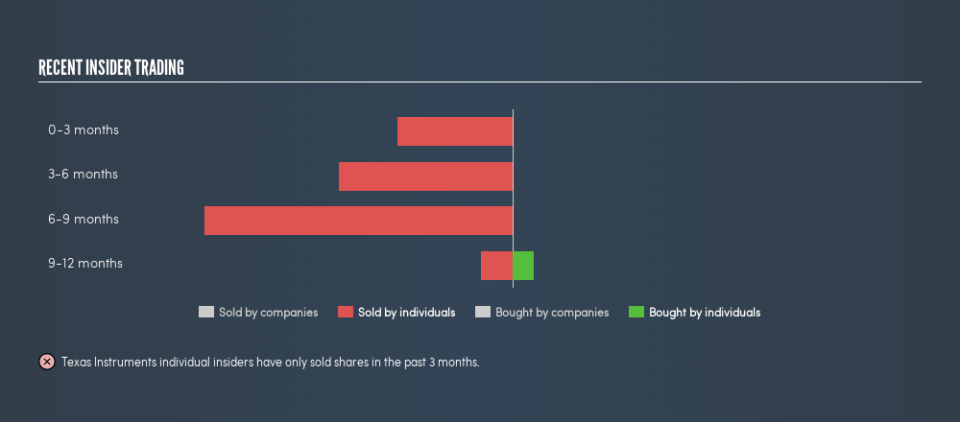Read This Before Buying Texas Instruments Incorporated (NASDAQ:TXN) Shares

It is not uncommon to see companies perform well in the years after insiders buy shares. The flip side of that is that there are more than a few examples of insiders dumping stock prior to a period of weak performance. So we'll take a look at whether insiders have been buying or selling shares in Texas Instruments Incorporated (NASDAQ:TXN).
What Is Insider Selling?
Most investors know that it is quite permissible for company leaders, such as directors of the board, to buy and sell stock in the company. However, rules govern insider transactions, and certain disclosures are required.
We would never suggest that investors should base their decisions solely on what the directors of a company have been doing. But it is perfectly logical to keep tabs on what insiders are doing. For example, a Harvard University study found that 'insider purchases earn abnormal returns of more than 6% per year.'
See our latest analysis for Texas Instruments
Texas Instruments Insider Transactions Over The Last Year
Over the last year, we can see that the biggest insider sale was by the Senior Vice President of Analog Power Products, Niels Anderskouv, for US$6.5m worth of shares, at about US$117 per share. So it's clear an insider wanted to take some cash off the table, even below the current price of US$120. When an insider sells below the current price, it suggests that they considered that lower price to be fair. That makes us wonder what they think of the (higher) recent valuation. However, while insider selling is sometimes discouraging, it's only a weak signal. It is worth noting that this sale was only 39.7% of Niels Anderskouv's holding.
Over the last year we saw more insider selling of Texas Instruments shares, than buying. You can see a visual depiction of insider transactions (by individuals) over the last 12 months, below. If you want to know exactly who sold, for how much, and when, simply click on the graph below!
I will like Texas Instruments better if I see some big insider buys. While we wait, check out this free list of growing companies with considerable, recent, insider buying.
Insiders at Texas Instruments Have Sold Stock Recently
The last three months saw significant insider selling at Texas Instruments. Specifically, insiders ditched US$7.6m worth of shares in that time, and we didn't record any purchases whatsoever. In light of this it's hard to argue that all the insiders think that the shares are a bargain.
Insider Ownership
Looking at the total insider shareholdings in a company can help to inform your view of whether they are well aligned with common shareholders. A high insider ownership often makes company leadership more mindful of shareholder interests. Texas Instruments insiders own about US$242m worth of shares (which is 0.2% of the company). Most shareholders would be happy to see this sort of insider ownership, since it suggests that management incentives are well aligned with other shareholders.
So What Do The Texas Instruments Insider Transactions Indicate?
Insiders sold Texas Instruments shares recently, but they didn't buy any. And our longer term analysis of insider transactions didn't bring confidence, either. But since Texas Instruments is profitable and growing, we're not too worried by this. The company boasts high insider ownership, but we're a little hesitant, given the history of share sales. Of course, the future is what matters most. So if you are interested in Texas Instruments, you should check out this free report on analyst forecasts for the company.
Of course, you might find a fantastic investment by looking elsewhere. So take a peek at this free list of interesting companies.
For the purposes of this article, insiders are those individuals who report their transactions to the relevant regulatory body. We currently account for open market transactions and private dispositions, but not derivative transactions.
We aim to bring you long-term focused research analysis driven by fundamental data. Note that our analysis may not factor in the latest price-sensitive company announcements or qualitative material.
If you spot an error that warrants correction, please contact the editor at editorial-team@simplywallst.com. This article by Simply Wall St is general in nature. It does not constitute a recommendation to buy or sell any stock, and does not take account of your objectives, or your financial situation. Simply Wall St has no position in the stocks mentioned. Thank you for reading.

 Yahoo Finance
Yahoo Finance 
